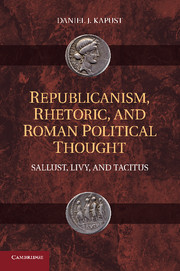Book contents
- Frontmatter
- Contents
- Acknowledgments
- 1 Introduction
- 2 An Ambiguous Republican
- 3 Channeling Conflict through Antagonistic Rhetoric in the War with Catiline
- 4 Exemplarity and Goodwill in Livy's From the Founding of Rome
- 5 Tacitus on Great Men, Bad Rulers, and Prudence
- 6 Tacitus' Moral Histories
- Epilogue
- Bibliography
- Index
- References
6 - Tacitus' Moral Histories
Published online by Cambridge University Press: 03 May 2011
- Frontmatter
- Contents
- Acknowledgments
- 1 Introduction
- 2 An Ambiguous Republican
- 3 Channeling Conflict through Antagonistic Rhetoric in the War with Catiline
- 4 Exemplarity and Goodwill in Livy's From the Founding of Rome
- 5 Tacitus on Great Men, Bad Rulers, and Prudence
- 6 Tacitus' Moral Histories
- Epilogue
- Bibliography
- Index
- References
Summary
INTRODUCTION
In the prior chapter, I developed a reading of Tacitus' Agricola and Dialogue on Orators as negotiating the tensions between contumacy and obsequiousness. Tacitus seeks to find some middle ground between foolish and futile outspokenness, on the one hand, and cooptation and sycophancy, on the other. At the same time, while facing an ambiguous peace and present, he tries to find an active alternative to withdrawal from public life – the tactic of Maternus – that entails integrity and not abject flattery. In this regard, then, Agricola provided a prudent model to imitate and study, unlike Maternus who, despite his second exculpatory speech, seemed naïve to the realities of moving in the public eye under an emperor.
These realities reflected the concentration of power in the hands of a single ruler, an individual whose behavior and character were of great importance in setting the conditions of the active life in politics. Understanding the character of the ruler is central to understanding whether and when one might or might not be interfered with, or whether one might or might not speak with relative freedom. Behavior that might be appropriate under Nerva or Trajan might be inappropriate under Nero or Domitian, for example. If character was of such great importance, it became imperative to find a way to read the ruler and to develop the ability to read and react rightly to rulers.
- Type
- Chapter
- Information
- Republicanism, Rhetoric, and Roman Political ThoughtSallust, Livy, and Tacitus, pp. 141 - 172Publisher: Cambridge University PressPrint publication year: 2011

